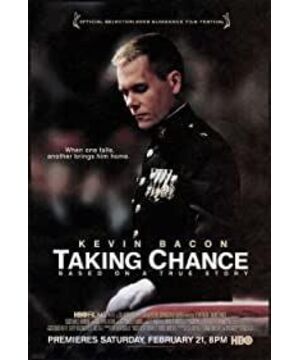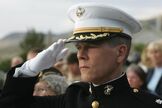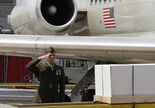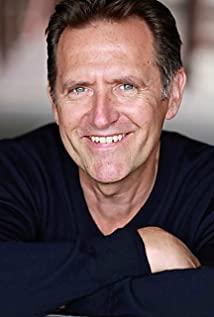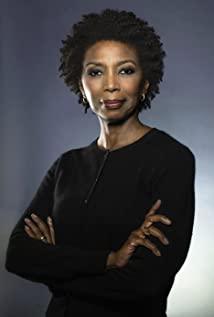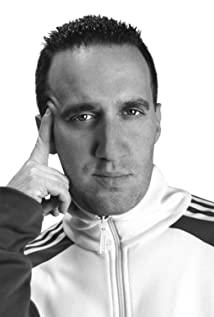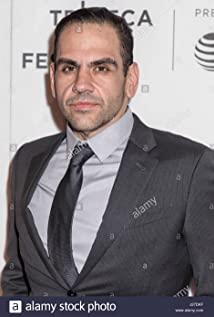Marine Corps Colonel Mike, every night before going to bed, go to the Internet to check the list of soldiers killed in the Iraq War. Pray not to see anyone I know well. One morning he walked into the general's office and asked to escort the body of Private Chancellor home. The general reminded, "You are a high-ranking officer." Mike said, "This 19-year-old kid is from the same town as me. I didn't go to war, I hope I can do this for him."
The story of the body escort , struck me with a force of extraordinary simplicity. Almost every shot of the film is saying the same thing, which is respect for the dead and their remains. In the military mortuary, countless staff members cleaned the blood-stained relics again and again. Especially a black female officer, after cleaning Chance's hands, a pair of black, female living hands rested on the white and limp hands of the deceased. This is one of the hundreds of shots that struck me.
The funeral ceremonies are all closed coffins, and relatives will only see the photos of the remains, not the remains with their own eyes. But for this photo of the fallen soldier, this country really spared no expense. What is more precious is that there are countless people who are committed to a person's remains. No, not to Chance's body, but to the deeds of his life, and to his undead soul. There is an elaborate detail in the movie: the officer responsible for dispatching the escort handed Mike two flags. He said that because Chance's parents were divorced, they had to be given to them separately.
As a military escort, Mike had medals on his chest and spanned more than half of the United States. At airports, restaurants, warehouses, and stations, the military salutes are slowly raised and lowered again and again to greet each loading of the remains. At the turn of the plane, the porters gathered around to salute Chance with Mike. Over Philadelphia, a flight attendant crouched down, woke him gently, and placed a cross in his palm. Everyone seems to know what an escort officer does. On another flight, a stylish girl sat next to him and texted a friend that the officer next to him was handsome. After arriving, the captain broadcasted that we also had a fallen soldier on board, please stay in your seats and let the escort get off the plane first. The girl turned her head and said softly to Mike with sudden motherhood, "I'm sorry." Mike stood at the luggage loading dock and slowly raised his hand again. All the passengers stopped and paid tribute to Chance who was lying forever. . He lost his life in a war they identified or didn't identify with. But what is precious is that now he has been sent back to his hometown like a prince who died.
The meticulous repair of the corpse in the Japanese movie "The Undertaker" is out of a pantheistic reverence for life. The undertaker stood by the river and saw the salmon migrating and dying on the way. That scene points to the director's philosophical background. Unlike Escort Chance, each shot affirms one thing—the entire nation's responsibility for the dead. After giving the relics to Chance's parents, Mike said, "I have to let you know that there are countless people along the way to pay tribute to your children."
The most precious thing is that it all happened. Mike filled out the escort report on the return trip, perhaps because he didn't want to be as formulaic as the junior officer wrote, he crossed out the word "report" and changed the title to "Escort Chance", carefully recording the respect that countless Americans showed to the dead . The story then circulated online and was made into a documentary last year, which was nominated for an Oscar for Best Documentary. This year, it was remade and nominated for the Best Jury Prize at the Sun Danser Film Festival.
Those who died for us deserve to be treated this way. It's not about whether the battle should be fought or not, whether it's worth your child's death. Because a person's death is worth remembering or not, it has nothing to do with whether he is worth dying or not. There is at least one thing that deserves our respect, and that is death itself. A person sent us a letter with his own death, even if some of us go, we will finally go.
In other words, those who die go for us; those who go are always somehow related to us. Last summer, a volunteer came back from Mianyang and brought me a photo of a crayon drawing of a little girl with the same name as me in the Kyushu Gymnasium. At that moment I, like Mike, couldn't help but think it had something to do with me. Then online, I found a picture of the survivor. A year later, like Mike, I searched the Internet for the list of students who died in the earthquake, until I saw another little boy with the same name, a second-year student of Jiulong Central Primary School in Jiulong Town, Mianzhu.
In 1993, Solzhenitsyn had been in exile for 20 years. On the eve of his return to China, he said a paragraph to a Russian reporter, to the effect that we must fulfill the obligation to commemorate the dead. Without remembrance, the history of the people does not exist.
But how am I going to escort this little boy. In this life, we have few people to escort, and many people to commemorate, so much that we can only give each person a few seconds. The absurdity of life lies not in death, but in the living, who cannot commit themselves to those who need to be remembered. That's why other people's deaths don't move me. Only those with hyperlinks to me whose death is closer to me. In other words, relatives and our links are visible. A fellow countryman, a person with the same name, and we can also click on each other. But other people and our links are often invisible. If you can't see it, you can't see it, it's always a convenient, materialistic excuse.
The colonel escorted Chance also because he didn't feel like a soldier sitting in the office. Seeing a 19-year-old fellow countryman die, he felt a sense of guilt, as if Chance had died for him. He believes that he is reluctant to part with the warmth of his family, and is used to hugging his wife and children. The fear of losing all of this outweighs his commitment to his position. This was his potential motivation to pursue a civilian career after his promotion in the Gulf War. In the face of the death of his colleagues, he could not find the legitimacy of his own existence. In this sense, when he slowly salutes Chance again and again in front of countless ordinary citizens, he regains the assurance of military status. This is why he insisted on not taking off his military uniform and medals at the airport security checkpoint.
What we do, if meaningful, means having a home, more than a home on earth. Otherwise, all ideals and careers will essentially conflict with our responsibilities to the family. There must also be a kind of blood relatives above the blood relatives on earth; there must be a kind of brethren above the brethren on earth; there must be an invisible link above the visible link. Otherwise, when you say "there are brothers in the four seas", and you say "blood is thicker than water", it is not a dream that cannot be realized, or a lie to coax us to die.
Whether it's an 8-year-old boy or his biological parents, I didn't bring you here, and I can't bring you home. I cannot save, only accompany. Crossing the road with my mother this morning, a car came ignorantly at a red light. I reached out and motioned for him to stop. I think of Tan Zhuo in Hangzhou, who was walking in his prime when he was hit by a speeding car and died on a zebra crossing. At that moment, my outstretched hand stopped in the air for about two seconds. I silently prayed to the God of heaven in my heart, and took my gesture as the military salute that Mike slowly raised in the movie.
Kevin Bacon, Escort Chance
View more about Taking Chance reviews


